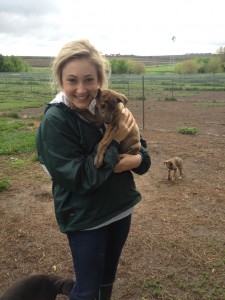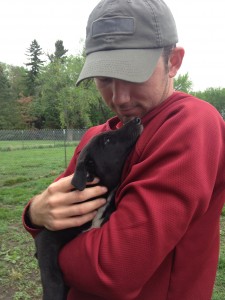I think by now everyone on this trip knows I’m not a particularly cheery morning person. For me, a coherent Haden is solely reliant on a large intake of coffee. But now, I think we’ve found a new source of morning motivation for me. Groggy and sleepy-eyed, we arrived at the Hill’s property. Upon seeing those precious Greyhound puppies, our level of alertness certainly rose. We helped the Fiscus girls make their rounds of feeding and playing with the dogs. Needless to say, it didn’t take long to forget our 6 AM wake up call.
From there, we returned to spiff ourselves up for our later meeting with the Soybean Association. We spoke a lot with them on the subject of local foods, which is a concept I have been very interested in, and have heard so much about on this trip. Their concept was quite different than any I have ever heard, and raised a few concerns in my mind. Hellmans Mayonnaise and McDonalds, they argued, could be considered local food to Iowa. Soybeans, after all, were mostly all grown here, so, of course, it could be considered local. I was immediately skeptical of their definition of local food, if it included Hellmans and McDonalds. Doesn’t the transport of these soybeans to various manufacturers in far away locations only to be stripped of their soybean form negate their status as a local food?
Another claim was that super markets contributed fewer carbon emissions than farmers’ markets, thus making them more economically sustainable. They believed that all the farmers individually driving their products to market causes a heavier carbon footprint than massive food producers shipping their food product over large distances with multiple other products. But I don’t accept this view of local foods. While yes, the individual farmers making their own trips does cause quite the footprint, I am of the understanding that these huge mass food producers and transporters sending their product all over the country and back again most definitely could give the farmers a run for their money. From the huge tractors in the field all the way down to the semi that drops the food off at Walmart, surely that has to make quite a carbon footprint of its own. To believe that supporting local farmers and businesses is actually more detrimental to our environment than shopping at a supermarket will require much more evidence to convince me.


